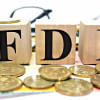FDI flow drops 36% in Q3

The flow of foreign direct investment (FDI) to Bangladesh declined 36 percent year-on-year in the third quarter of 2023 as the unstable exchange rate and political uncertainty spooked external investors' confidence.
According to data from the Bangladesh Bank, the country received $913 million in gross FDI between July and September of the calendar year, down from $1.43 billion during the corresponding period of 2022.
The net investments plunged to $670 million from $1.1 billion.
Between January and September of 2023, FDI flow dropped 24 percent year-on-year to $2.8 billion.
It comes as the US dollar appreciated by around 30 percent against the taka in the past two years. It traded at Tk 111 yesterday, which was Tk 86 in January 2022.
Amid higher outflows caused in the form of an elevated level of imports against moderate export and remittance receipts, foreign currency reserves have halved to around $20 billion from more than $40 billion in August 2021.
The lower flow of FDI has been one of the major factors for Bangladesh's unprecedented financial account deficit.
The financial account, a key component of a country's balance of payments (BoP), records transactions that involve financial assets and liabilities and that take place between residents and non-residents.
Figures from the central bank showed that the deficit in the financial account stood at $5.39 billion in July-November of FY24, which was $4.03 billion in July-October.
"If an unstable exchange rate prevails, it affects investor confidence and decision-making. This has prevailed in Bangladesh in the last six months. Therefore, the FDI inflow declined sustainably in the third quarter of the year," said M Masrur Reaz, chief executive officer of the Policy Exchange Bangladesh.
The situation was not conducive for attracting FDIs, he said.
He said the exchange rate fluctuation has brought about uncertainty and added risks, making investors hesitant to commit significant capital.
"The volatile rate may lead to increased costs for businesses operating in Bangladesh and affect their profitability and the return on investment."
He said investors at home and abroad prefer stable economic conditions for making long-term investments.
"They are observing the situation in Bangladesh and may not make decisions until the exchange rate stabilises."
A senior official of the Bangladesh Investment Development Authority said an unstable exchange rate affects the competitiveness of a country's exports and imports, potentially impacting the overall economic environment and FDI.
The lingering macroeconomic crisis has paved the way for external investments to decline drastically and caused an erosion of investor confidence, he said.
The official also blamed the global economic turmoil brought on by the Russia-Ukraine war for the failing FDI in Bangladesh.
Mustafizur Rahman, a distinguished fellow at the Centre for Policy Dialogue, said the declining trend of both new investments and re-investments was not a good sign for the economy.
He said political uncertainty, volatile exchange rates, and higher inflation are discouraging the FDI flows.
"The uncertainty surrounding the general elections and the volatile macroeconomic situation were also the reasons behind the reduced FDI inflow."
He suggested the government pay heed to attracting FDIs in the coming months, particularly in economic zones, through an effective one-stop service.
Rupali Chowdhury, a former president of the Foreign Investors Chamber of Commerce and Industry, recommended Bangladesh focus on Asian countries such as Japan to draw investments as the nations are interested in investing in light engineering and diversified sectors.
"For this reason, we need to ensure long-term stable policy instead of frequent changes to policies regarding taxation and customs."
She also stressed the need for reforming the legal framework to improve the FDI situation.

 For all latest news, follow The Daily Star's Google News channel.
For all latest news, follow The Daily Star's Google News channel. 








Comments